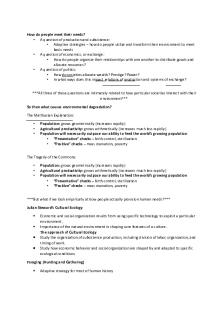Subsistence Strategies and Patterns PDF

| Title | Subsistence Strategies and Patterns |
|---|---|
| Course | Anthropology |
| Institution | University of Connecticut |
| Pages | 3 |
| File Size | 35.2 KB |
| File Type | |
| Total Downloads | 41 |
| Total Views | 160 |
Summary
Professor Cruz lecture notes...
Description
Subsistence Strategies and Patterns Four Types of Subsistence Foraging ● Hunting, gathering, fishing ● Produce nothing ● Usually the population is on the move (semipermanent housing) ● Earliest adaptive strategy used by humans- 96% of human existence ● Technology- includes knowledge ● Move in small bands (20-100) ● Camp moves periodically according to key resources ● Activities occur around a central base camp ● Satellite camps ● Carrying capacity- the maximum population that a habitat can sustain ○ Egalitarian- equal access/power and resources ○ Kin based populations ○ Due to mobility, few personal possessions ○ Limited status differentiation ○ Leisure time ■ Low energy budgets ○ Diets ○ Division of labor ■ Age ■ Gender ■ Flexible Horticulture ● Still foraging ● Changing the landscape by growing food in places that are not originally there ● Cultivations that does not make intensive use of land, labor, capital, or machinery ○ Simple tools, slash and burn/swidden techniques ○ Shifting between plots of land; exhausted plots left fallow for a period of time ● Shifting cultivation Pastoralism Agriculture ● A subsistence-procurement strategy that is based on intensive, continuous use of land for the production of plant foods ● Typically includes one or more of the following: cultivation of soils ● Kinship focus on nuclear kin ● Economic production specialization ○ Subsistence activities no longer based solely on the efforts of the family ○ Production for sale
○ Currency is then exchanged for other goods ● Populations largest ● Diet ○ Poor ○ Lack of diversity ● Division of labor varies by culture The consequences of Agriculture ● Sedentism ● More dependable food supply ● Food surplus ● Disease Reciprocity ● Exchange between social equals; normally related by kinship, marriage, or another close personal tie ○ Generalized reciprocity:giving someone something so the other succeeds ○ Balanced reciprocity: exchange between people who are more distantly related ○ Negative reciprocity: exchange with people on fringes or outside of social system; full of ambiguity and distrust Redistribution ● Goods or services move from the local level to a center ● Flow of goods eventually reverses directions The Market Principle ● In world capitalist economy, market principle governs distribution of means of production ○ Law of Supply and Demand Cohen (1974) Typologies ● Foragers ○ Hunter gatherers ○ Small group of people ○ Equally stratified society ○ Very well rounded in their diet ○ Travel where the food is ● Pastoralism ○ Animals are domesticated ○ Still some foraging ● Horticulture ○ Domesticated plants ○ Not as robust as foragers ○ Stay in one spot ○ Fallow - when land is no longer fertile and must be left alone so the land rejuvenates
● Agriculture...
Similar Free PDFs

L7. Copyright - Subsistence
- 17 Pages

Patterns and Sequences
- 2 Pages

Writing Patterns and Useful Phrases
- 69 Pages

Search and Control Strategies
- 6 Pages

Modes of Subsistence
- 4 Pages

Subsistence table - athropology
- 2 Pages
Popular Institutions
- Tinajero National High School - Annex
- Politeknik Caltex Riau
- Yokohama City University
- SGT University
- University of Al-Qadisiyah
- Divine Word College of Vigan
- Techniek College Rotterdam
- Universidade de Santiago
- Universiti Teknologi MARA Cawangan Johor Kampus Pasir Gudang
- Poltekkes Kemenkes Yogyakarta
- Baguio City National High School
- Colegio san marcos
- preparatoria uno
- Centro de Bachillerato Tecnológico Industrial y de Servicios No. 107
- Dalian Maritime University
- Quang Trung Secondary School
- Colegio Tecnológico en Informática
- Corporación Regional de Educación Superior
- Grupo CEDVA
- Dar Al Uloom University
- Centro de Estudios Preuniversitarios de la Universidad Nacional de Ingeniería
- 上智大学
- Aakash International School, Nuna Majara
- San Felipe Neri Catholic School
- Kang Chiao International School - New Taipei City
- Misamis Occidental National High School
- Institución Educativa Escuela Normal Juan Ladrilleros
- Kolehiyo ng Pantukan
- Batanes State College
- Instituto Continental
- Sekolah Menengah Kejuruan Kesehatan Kaltara (Tarakan)
- Colegio de La Inmaculada Concepcion - Cebu









